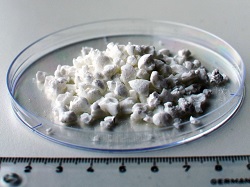 |
| Upsalite, the most absorbent material on Earth, shows potential for drug delivery.--Courtesy of Uppsala University |
A record-breaking material discovered last year by Swedish researchers has passed another milestone for drug delivery, showing it can hold poorly soluble drugs and, down the road, deliver them with a fast dissolution rate.
Many drugs, including the common painkiller ibuprofen, suffer from poor solubility--80% of all drug candidates have this weakness, in fact, according to a release from Uppsala Universitet in Sweden. And researchers there who last year discovered the magnesium carbonate material Upsalite--which demonstrated the highest surface area ever measured at 800 square meters per gram--have shown that the substance can completely suppress ibuprofen in a formulation, giving it a higher solubility and three times the dissolution rate.
Last year, the scientists found that Upsalite broke records for surface area and could be a potentially valuable tool in drug delivery. Like a sponge, it absorbs liquids rapidly and could act as a delivery vehicle like those currently used to deliver insulin, chemotherapy or autoimmune drugs. The accidental discovery showed that the material could be made easily and be used for a number of purposes, including electronics and environmental cleanup.
"We think the narrow pores hinder the drug molecules from organizing in a poorly soluble crystalline form and are forced to maintain an amorphous structure that is easier for the body to absorb," lead author Johan Gómez de la Torre said in a statement.
The university has spun out the company Disruptive Materials AB, which will focus on commercialization of Upsalite.
- here's the release